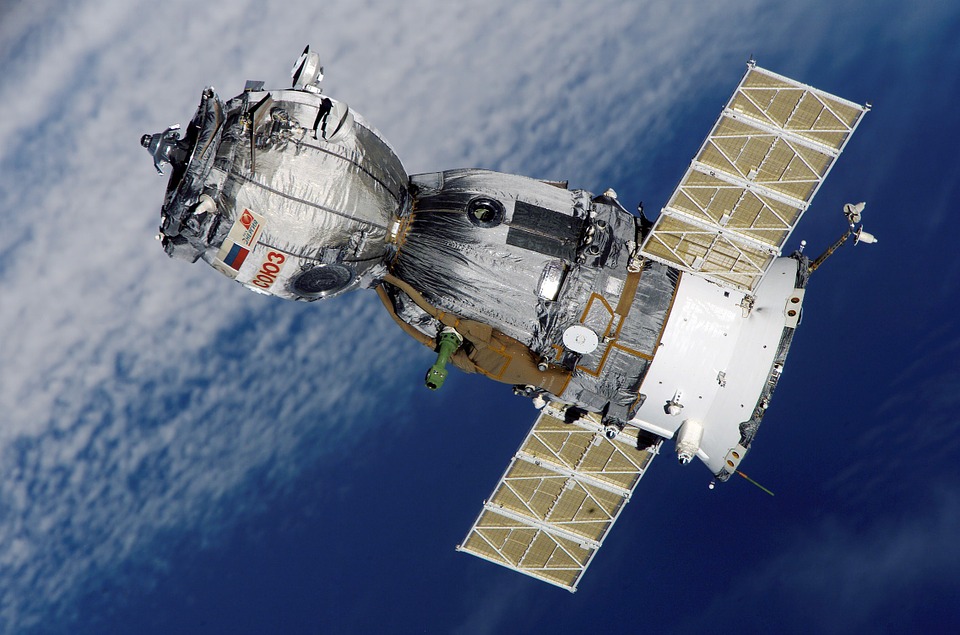-
US denounces Russia for ‘dangerous and irresponsible’ space missile test

Washington wasn’t informed in advance about the test, only the fourth ever to hit a spacecraft from the ground, and will talk to allies about how to respond, said officials.
The move reignites concerns about the growing space arms race, encompassing everything from the development of satellites capable of shunting others out of orbit to laser weapons.
Secretary of State Anthony Blinken in a statement said: “The Russian Federation recklessly conducted a destructive test of a direct-ascent anti-satellite missile against one of its own satellites."
 Space craft-Satellite/Pixabay
Space craft-Satellite/PixabayHe added that the “dangerous and irresponsible test” had generated over 1,500 pieces of trackable orbital debris and will likely create hundreds of thousands of pieces of smaller orbital debris.
Read more: UN Security Council praises Iraqis for commitment to democracy and peaceful election
The crew aboard the orbital outpost — currently four Americans, a German and two Russians — were awakened and first asked to close the station’s hatches, then take shelter in their return ships, the standard “safe haven” alarm procedure in the event of an emergency that might force evacuation.
They made their way to the Dragon and Soyuz spacecraft at 2:00 am Eastern Time (0700 GMT), and remained there for about two hours, NASA said. The ISS continues to pass near or through the cloud every 90 minutes.
He added, in his strongly-worded remarks, Blinken said the danger was far from over, and the debris would continue to threaten satellites and activities on the ISS. The United States was discussing its response with partners.
NASA administrator Bill Nelson added in a statement he was “outraged by this irresponsible and destabilizing action.”
He said: “With its long and storied history in human spaceflight, it is unthinkable that Russia would endanger not only the American and international partner astronauts on the ISS, but also their own cosmonauts” as well as Chinese “taikonauts” aboard China’s space station.
Read more: COP26 President says China and India must explain themselves to climate-vulnerable nations
The target of the missile was Cosmos 1408, a 1982 Soviet signals intelligence satellite that has been defunct for several decades, according to space industry analysis company Seradata.
Anti-satellite weapons (ASATs) are high-tech missiles possessed by few nations.
India was the last to carry out a test on a target in 2019, creating hundreds of pieces of “space junk” strongly criticized by other powers, including the United States.
The United States shot down a satellite in 2008 in response to China demonstrating a similar knockout in 2007.
Jonathan McDowell, a Harvard astrophysicist, told AFP: “The feeling among people in the space industry is that we have way too much debris up there already — to deliberately generate more is just inexcusable.”
He said, the first objects from the debris cloud should start to enter the atmosphere within a few months, but it could be up to 10 years before it clears up entirely.
That could jeopardize what is an increasingly crowded region of space known as “low Earth orbit.”
There are currently more than 4,500 satellites whizzing around the planet, according to the Union of Concerned Scientists, with companies like SpaceX planning to launch up to tens of thousands more, as the private space industry experiences rapid growth.
Russia is increasingly flexing its muscles in space as it seeks to reassert global influence under the leadership of Vladimir Putin.
Last year, London and Washington accused Moscow of testing a “nesting doll” satellite that opened up and released a smaller craft to stalk an American satellite.
Read more: City of Merritt in Canada forced to evacuate due to flooding
China meanwhile is developing a weapon known as Shijian-17, with a robot arm capable of grappling space vessels.
“Both China and Russia are increasingly building space into their military capabilities,” Director of National Intelligence Avril Haines said at a space seminar in Washington last week.
He added: “They have directed-energy weapons that allow them to essentially blind sensors on various satellites."
Despite these tensions, the United States and Russia have maintained strong space ties since the end of the Cold War, cooperating closely on the ISS, which they built together.
Source: arabnews
You May Also Like
Popular Posts
Caricature
BENEFIT Sponsors BuildHer...
- April 23, 2025
BENEFIT, the Kingdom’s innovator and leading company in Fintech and electronic financial transactions service, has sponsored the BuildHer CityHack 2025 Hackathon, a two-day event spearheaded by the College of Engineering and Technology at the Royal University for Women (RUW).
Aimed at secondary school students, the event brought together a distinguished group of academic professionals and technology experts to mentor and inspire young participants.
More than 100 high school students from across the Kingdom of Bahrain took part in the hackathon, which featured an intensive programme of training workshops and hands-on sessions. These activities were tailored to enhance participants’ critical thinking, collaborative problem-solving, and team-building capabilities, while also encouraging the development of practical and sustainable solutions to contemporary challenges using modern technological tools.
BENEFIT’s Chief Executive Mr. Abdulwahed AlJanahi, commented: “Our support for this educational hackathon reflects our long-term strategic vision to nurture the talents of emerging national youth and empower the next generation of accomplished female leaders in technology. By fostering creativity and innovation, we aim to contribute meaningfully to Bahrain’s comprehensive development goals and align with the aspirations outlined in the Kingdom’s Vision 2030—an ambition in which BENEFIT plays a central role.”
Professor Riyadh Yousif Hamzah, President of the Royal University for Women, commented: “This initiative reflects our commitment to advancing women in STEM fields. We're cultivating a generation of creative, solution-driven female leaders who will drive national development. Our partnership with BENEFIT exemplifies the powerful synergy between academia and private sector in supporting educational innovation.”
Hanan Abdulla Hasan, Senior Manager, PR & Communication at BENEFIT, said: “We are honoured to collaborate with RUW in supporting this remarkable technology-focused event. It highlights our commitment to social responsibility, and our ongoing efforts to enhance the digital and innovation capabilities of young Bahraini women and foster their ability to harness technological tools in the service of a smarter, more sustainable future.”
For his part, Dr. Humam ElAgha, Acting Dean of the College of Engineering and Technology at the University, said: “BuildHer CityHack 2025 embodies our hands-on approach to education. By tackling real-world problems through creative thinking and sustainable solutions, we're preparing women to thrive in the knowledge economy – a cornerstone of the University's vision.”
opinion
Report
ads
Newsletter
Subscribe to our mailing list to get the new updates!






















